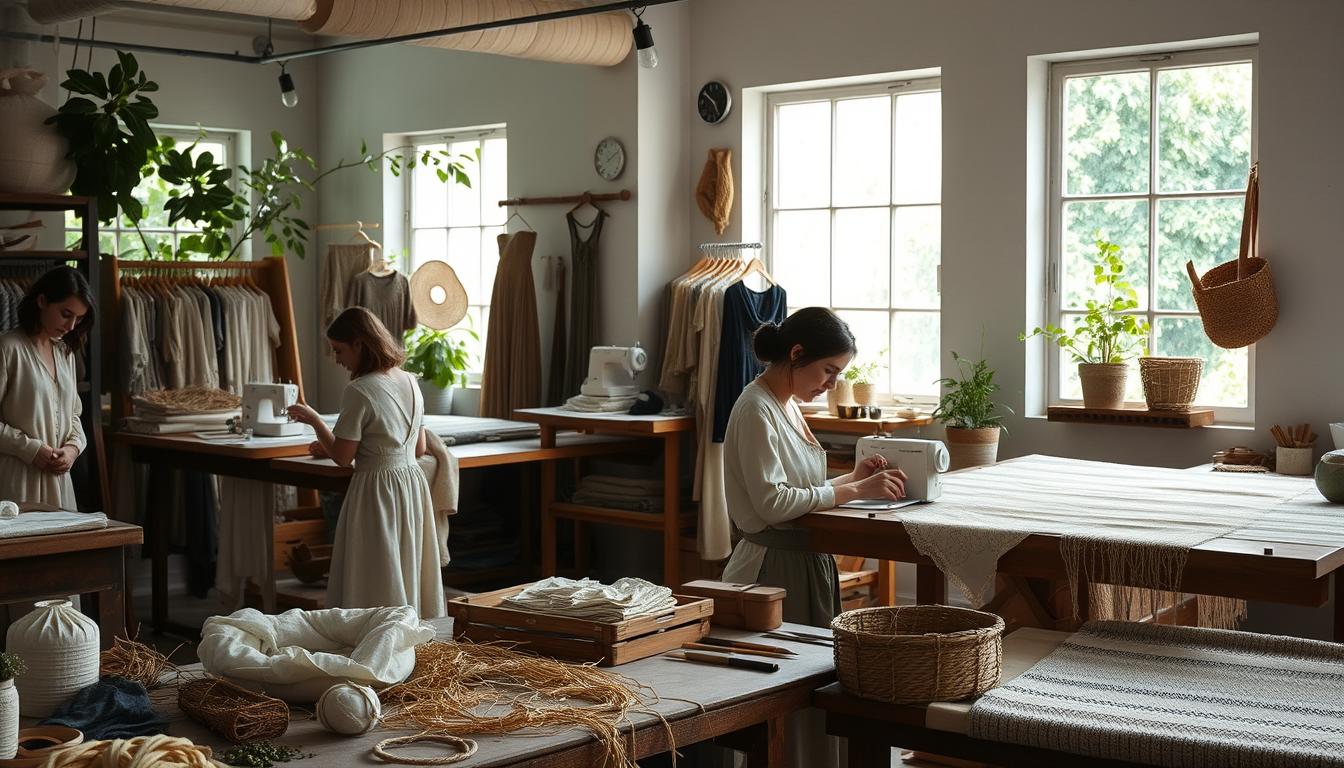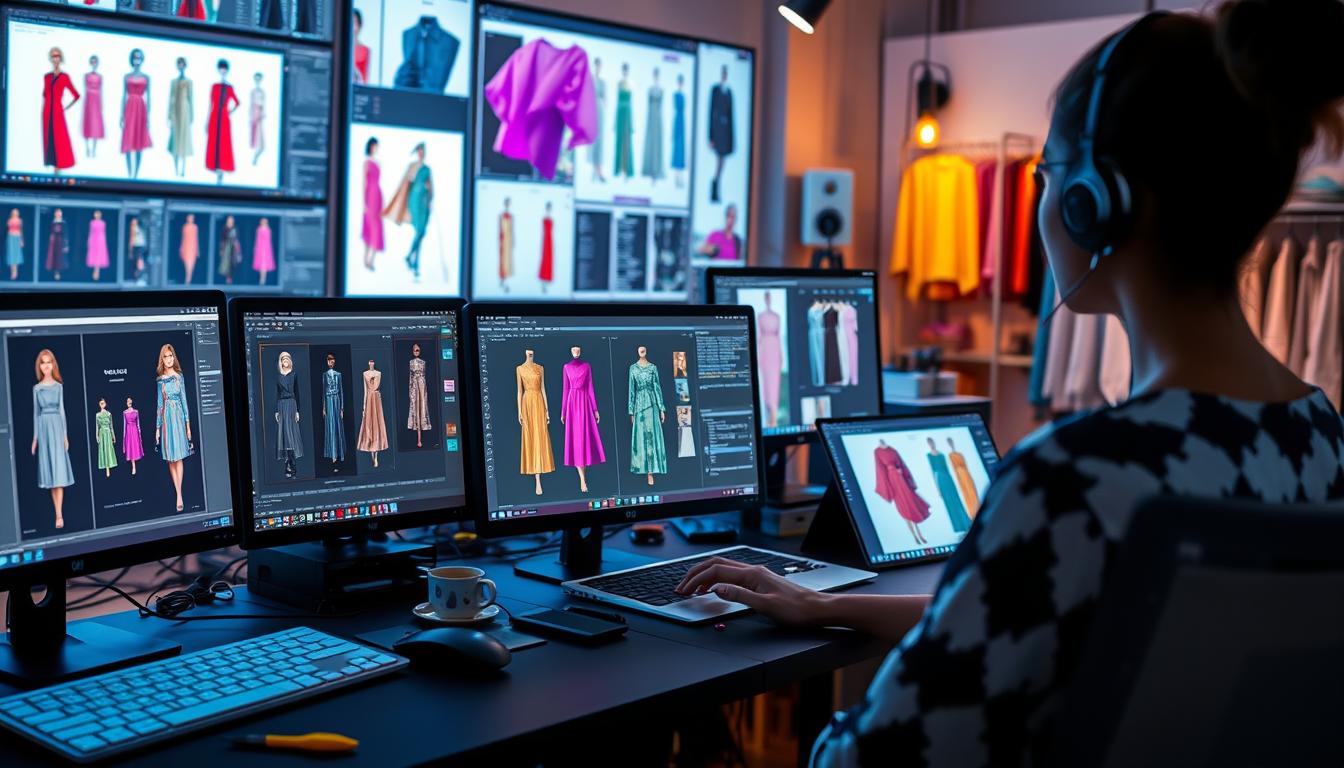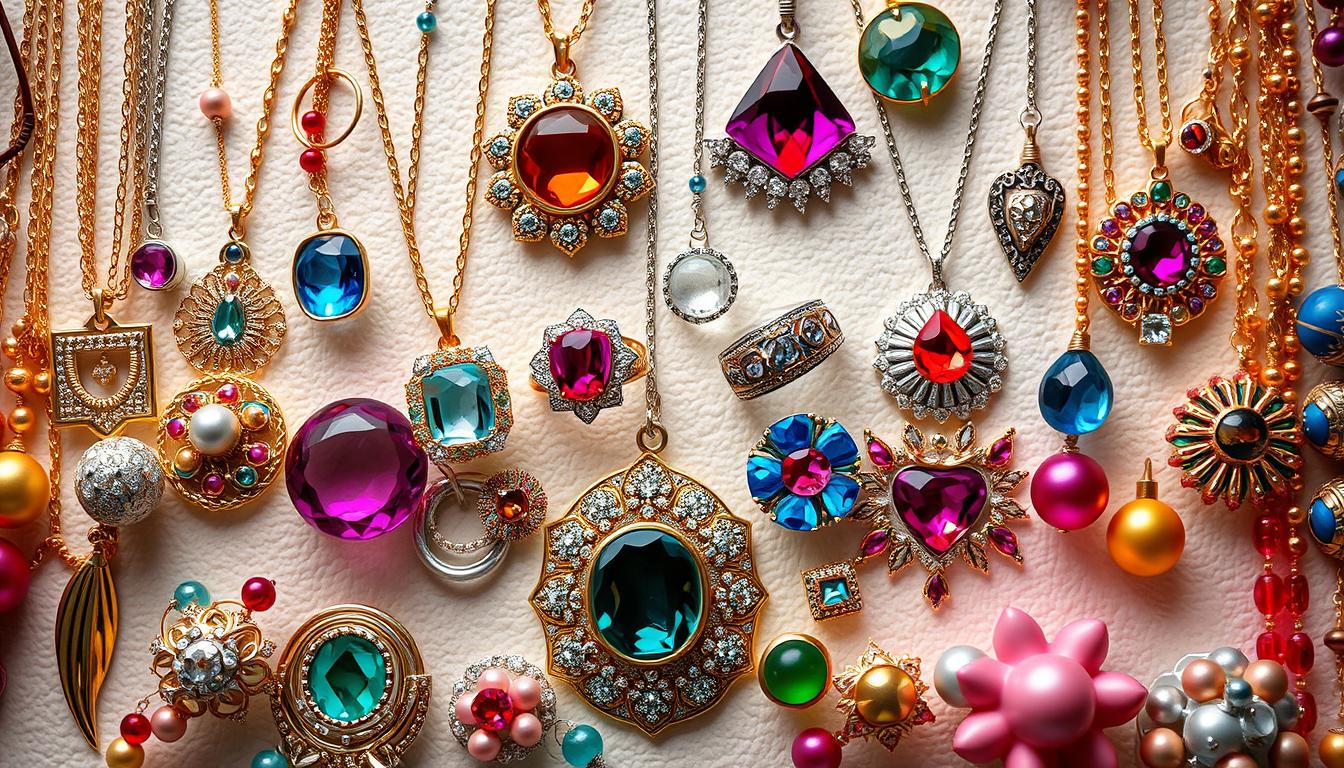We think the fashion world can do a lot of good. It starts with making clothes the right way. By using green materials and caring for workers, we can make fashion better for everyone and the planet. Let’s talk about why using sustainable materials, treating workers fairly, and cutting down on waste are so important.
We want to show how the fashion industry needs to change. We need to focus on making clothes in a way that’s good for the planet and people. Together, we can make fashion better for all of us.
Key Takeaways
- Adopting ethical production practices in the fashion industry is key for a sustainable future
- Sustainable fashion manufacturing can cut down on waste and harm to the environment
- Eco-friendly clothing production is vital for a responsible fashion industry
- Fair labor practices and less waste are essential for ethical fashion production
- By working together, we can make fashion better for people and the planet
- Ethical fashion production is an ongoing effort that needs constant improvement and new ideas
Understanding Ethical Production in Fashion
Exploring the fashion world, we see the value of ethical production. The fair trade fashion industry is at the forefront. It champions transparent supply chain fashion and ethical labor practices in fashion. This benefits the planet and ensures workers are treated right.
Key parts of ethical production include:
- Using eco-friendly materials
- Reducing waste and emissions
- Promoting fair labor practices
Supporting brands that focus on ethical labor practices in fashion helps the industry grow. The fair trade fashion industry is making big moves. It’s vital to value transparent supply chain fashion in this journey.
As consumers, we can influence change. By backing brands that value ethical production, we help make fashion better. This way, we support a more sustainable and fair fashion world.
| Aspect | Importance |
|---|---|
| Eco-friendly materials | Reduces environmental impact |
| Fair labor practices | Ensures worker well-being |
| Transparent supply chain | Promotes accountability |
The Impact of Fast Fashion
Exploring the fashion world, we see the big problems of fast fashion. Cheap, trendy clothes are made fast and used quickly. This hurts the environment, people, and the economy. We need to look at cruelty-free fashion production and ethical sourcing in fashion industry to fix these issues.
The fashion industry is a huge polluter. Clothes production and delivery harm our planet. But, sustainable fashion manufacturing can lessen this damage. Using green methods and materials makes fashion better for our planet.
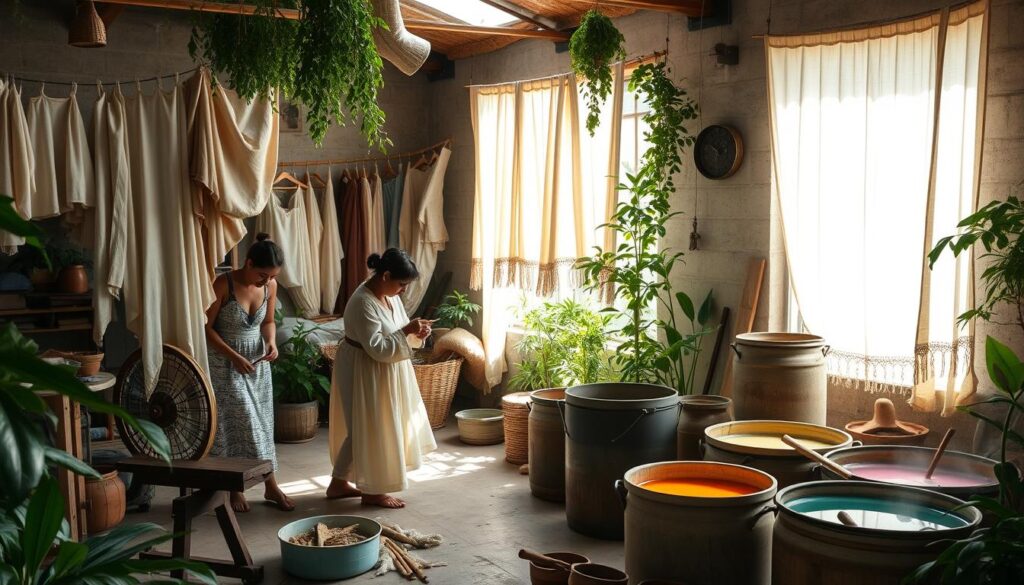
- Environmental degradation: pollution, waste, and resource depletion
- Social implications: exploitation of workers, poor working conditions, and unfair labor practices
- Economic considerations: unstable employment, low wages, and negative impacts on local economies
Supporting cruelty-free fashion production and ethical sourcing in fashion industry helps the industry be better. As buyers, we can push for change. This way, we can make fashion and our planet healthier together.
Sustainable Materials We Can Use
We are dedicated to making eco-friendly clothes. Using sustainable materials is a key part of this. The fashion world needs to be kinder to our planet. Fair trade fashion is important too, making sure workers get a fair deal.
There are many sustainable materials to choose from. Here are a few:
- Organic cotton, which is grown without harmful chemicals
- Recycled fabrics, made from old clothes or plastic bottles
- Hemp, a strong crop that needs little water and no pesticides
Benefits of Sustainable Materials
Using sustainable materials has many advantages. They help protect our environment and support fair trade. This makes the fashion world a better place for everyone.
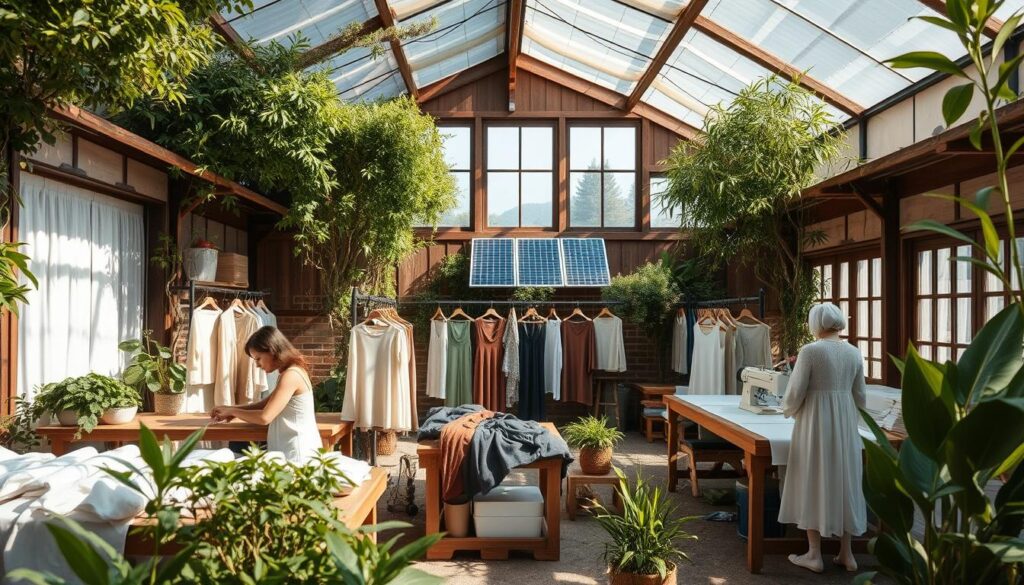
Implementing Sustainable Materials in Fashion Production
Using sustainable materials is a big step towards a better fashion industry. We can find suppliers who care about fair trade and the planet. Together, we can make fashion more sustainable.
| Material | Benefits | Challenges |
|---|---|---|
| Organic Cotton | Less harm to the environment, better for workers | More expensive, harder to find |
| Recycled Fabrics | Less waste, saves resources | Quality issues, limited sources |
| Hemp | Very durable, needs little water and no pesticides | More costly, not always easy to find |
Fair Labor Practices in the Industry
We think fair labor practices are key in the fashion world. It’s important to make sure workers get fair pay and work in safe places. This is why ethical labor practices in fashion are so important. They help make sure everyone is treated right and that we know where our clothes come from.
A transparent supply chain fashion industry cares about its workers. It makes sure they are treated well, from making clothes to selling them. Using cruelty-free fashion production helps the planet and makes workers’ lives better.
Here are some ways to make labor fair:
- Give workers fair pay and benefits.
- Make sure work places are safe and healthy.
- Be open and honest about where things come from.
Working together, we can make fashion better for people and the planet. 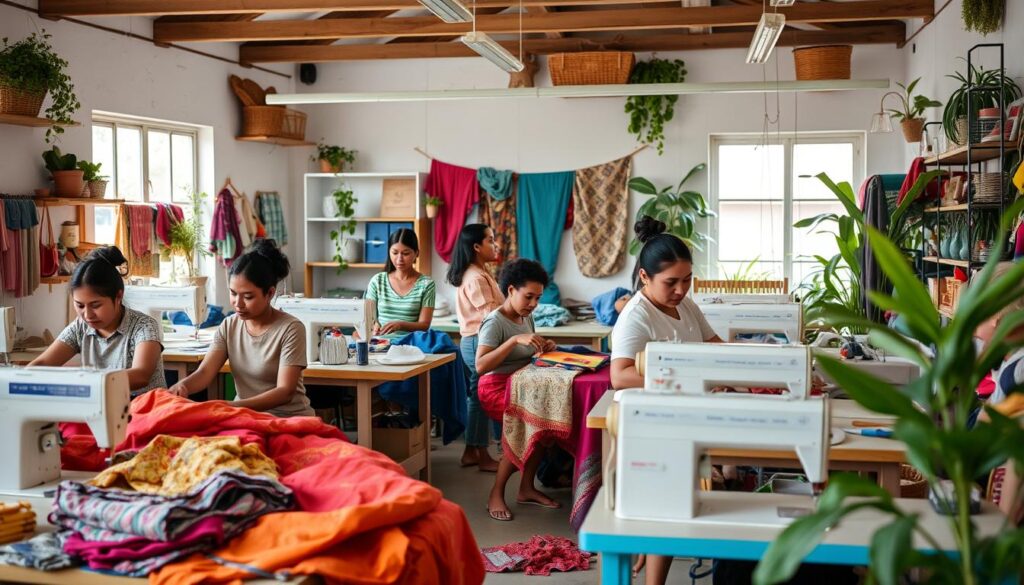
| Company | Initiative | Impact |
|---|---|---|
| Patagonia | Fair Labor Program | Improved working conditions for over 50,000 workers |
| Reformation | Sustainable Manufacturing | Reduced carbon footprint by 50% |
| Everlane | Transparent Supply Chain | Increased transparency and accountability throughout the supply chain |
Transparency in Fashion Supply Chains
Transparency in fashion supply chains is key for a sustainable fashion industry. Transparent supply chain fashion lets consumers know what they’re buying. It ensures materials are sourced responsibly, with little harm to the environment.
Sustainable fashion manufacturing is at the core of this. It means using less waste, saving energy, and treating workers fairly. We must look at every step in the supply chain, from making to selling.
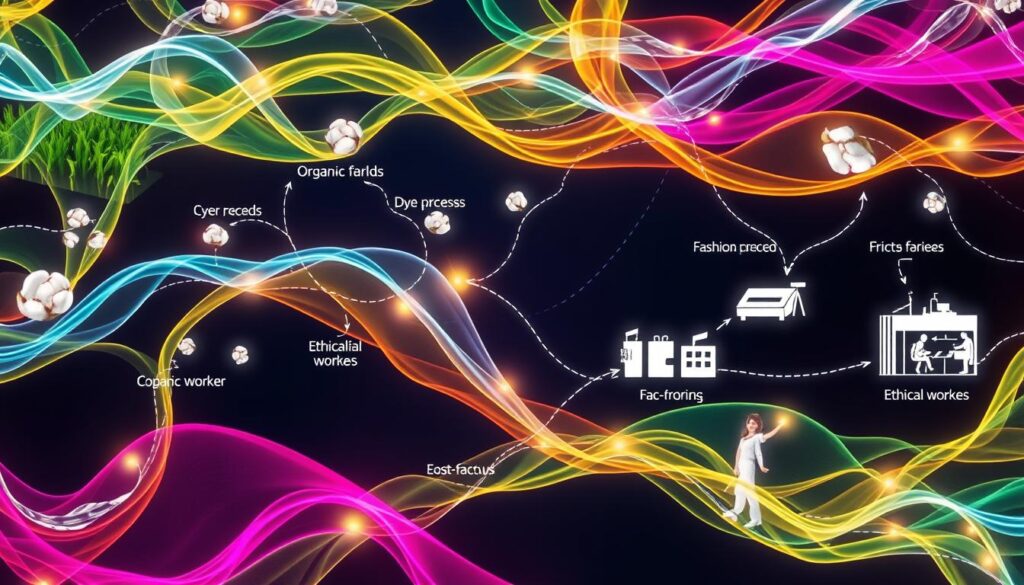
The Role of Certifications
Certifications show if brands follow sustainable and ethical rules. The Global Organic Textile Standard (GOTS) and Fair Trade Certified are examples. They prove products are good for the planet and people.
Consumer Awareness
It’s important for consumers to know about transparent supply chain fashion and ethical sourcing in fashion industry. Teaching people about these topics helps the fashion world become more sustainable. We can all choose to buy clothes that are better for our planet.
Supporting Local Artisans
We think it’s key to support local artisans for the fair trade fashion industry. Working with craft communities helps us promote eco-friendly and ethical fashion. This way, we cut down the fashion industry’s carbon footprint and keep traditional skills alive.
Some benefits of local production include:
- Reduced transportation costs and emissions
- Promotion of traditional craftsmanship and cultural heritage
- Support for local economies and fair labor practices
When we work with local artisans, we follow fair trade and eco-friendly principles. We ensure they get fair wages, safe workspaces, and chances to grow. This makes the fashion industry more responsible and green.
We aim to positively change the fashion world by backing ethical and local production. Together, we can build a sustainable and fair fashion industry that’s good for everyone and the planet.
We’ll keep focusing on fair trade, eco-friendly, and ethical fashion. We invite you to join us in making the fashion industry better for all.
Reducing Waste in Fashion
We think it’s key to cut down on waste in the fashion world. By using cruelty-free fashion production and ethical sourcing in fashion industry, we can make a big difference. This is all about sustainable fashion manufacturing.
Looking into ways to lessen waste, we find cool ideas like circular fashion. It’s all about using and recycling materials, not needing new ones. By going for circular fashion, we help make the industry more sustainable and cut down on waste.
Circular Fashion Concepts
Circular fashion is all about making things that can be fixed and reused. It’s about getting the most out of materials and then recycling them. This way, we can make the fashion world less wasteful and more ethical sourcing in fashion industry.
Upcycling and Repurposing
Upcycling and repurposing are great for cutting down waste. Upcycling turns old stuff into something new and valuable. Repurposing finds new uses for things we already have. These methods help us use fewer new resources and support cruelty-free fashion production.
By using these methods, we can make the fashion world more sustainable and ethical. As we keep looking for ways to reduce waste, we’re building a greener future for fashion.
Eco-Friendly Manufacturing Processes
We think making clothes in an eco-friendly way is key for a better fashion world. By using ethical methods, we can lessen our harm to the environment. This means using less energy and water in our making processes.
Here are some ways to do it:
- Switch to renewable energy like solar or wind power to cut down on fossil fuel use
- Use water recycling systems to save water and reduce waste
- Make less waste by using recycled materials and improving how we make things
Together, we can make fashion better for everyone and the planet. We aim to be open and fair in our eco-friendly efforts. This way, we ensure everyone is treated right.
We’re always looking for new ways to be kinder to the earth and support fair trade. By choosing eco-friendly clothes and backing ethical fashion, we help make a greener future for fashion.
The Role of Technology in Ethical Fashion
We see how important technology is for sustainable fashion manufacturing and transparent supply chain fashion. It helps make the fashion industry more responsible and green. This is thanks to technology.
Technology is changing the fashion world in big ways. It helps create sustainable materials and makes production more efficient. For example, some companies use digital platforms to support sustainable fashion manufacturing and cut down on waste.
Technology is key in making the fashion industry more open and accountable. It helps fashion brands follow ethical sourcing in fashion industry practices. This is vital for a greener future. For more on sustainable fashion, check out this guide. It talks about the good of sustainable fashion and how you can help.
Educating Consumers on Ethical Choices
We think it’s key to teach people about making ethical choices in fashion. By sharing how their buys affect the world, we help them make better choices. This supports fair trade fashion industry and cruelty-free fashion production.
Here are some ways to teach people:
- Label products with info on materials and labor
- Be open about where and how things are made
- Give workshops on sustainable fashion
These actions help people think more about what they buy. As they learn, they’ll want to buy things that are good for everyone and the planet. This means they’ll look for ethical production practices and support brands that care about fair trade and cruelty-free.
Teaching people about making good choices is a big step towards a better fashion world. Together, we can make a difference. We can help the fair trade fashion industry focus on people, planet, and profit.
| Initiative | Goal | Impact |
|---|---|---|
| Consumer Education | Promote conscious consumerism | Increased demand for ethical production practices |
| Transparency in Supply Chains | Provide information about manufacturing processes | Improved working conditions and reduced environmental impact |
| Sustainable Fashion Practices | Encourage environmentally-friendly production methods | Reduced waste and decreased carbon footprint |
Moving Towards a Better Future
As we wrap up our look at ethical fashion, it’s clear we all must work together for change. We need to follow ethical fashion standards, support sustainable making, and choose eco-friendly clothes. This way, we can make the fashion world a better place for everyone.
Collective Responsibility in Fashion
Everyone in the fashion world has a part to play in making things better. Designers, makers, sellers, and buyers all have roles. We must all make sure ethics are at the center of what we do. This shared effort is what will change the fashion industry for the good.
Our Commitment to Change
At the core of this effort is a promise to value people, planet, and profit equally. We vow to keep finding new ways, building alliances, and teaching others about ethical fashion. Together, we can create an industry that’s not just stylish but also good for people and the planet.

